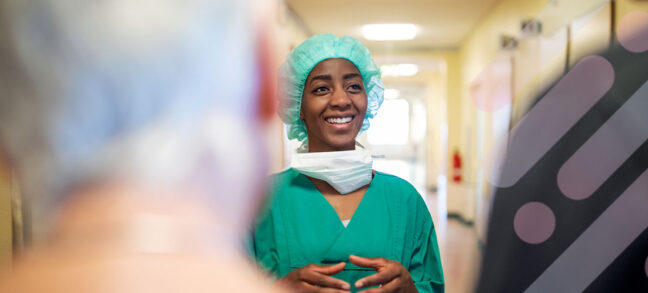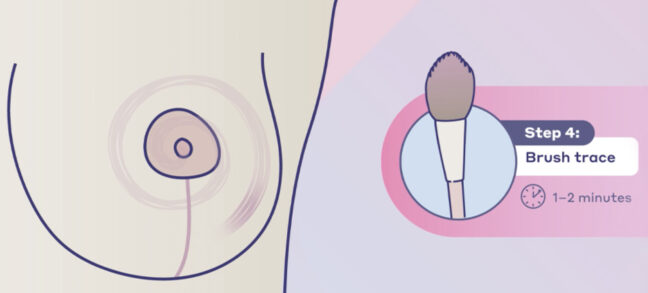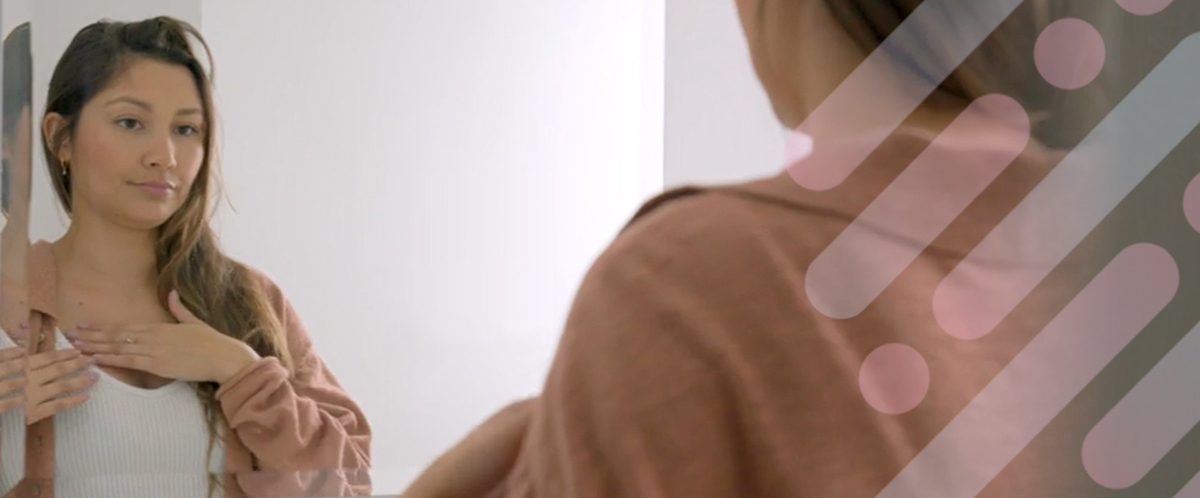Bri Majsiak is a co-founder of The Breasties, the first all-inclusive nonprofit organization to create a community for survivors, previvors, thrivers and carevivors of breast and gynecologic cancers. She is also a breast cancer previvor and Resensation patient.
Bri’s story
Bri was just five years old when she lost her mother to stage 4 breast cancer.
Growing up without a mother was hard enough, but the possibility of a cancer diagnosis was always in the back of Bri’s mind. Bri worried constantly about her increased risk of breast cancer, and at 17 she had her first breast screening. Doctors found a mass, which required Bri to go through the process of getting a biopsy. Luckily, it was benign.
She continued regular screenings throughout college, eventually opting for genetic testing to see if she was predisposed for the same kind of cancer her mom had. When she tested negative for BRCA, but positive for a lesser-known gene associated with breast cancer, she was ready to take control.
A proactive approach, a lingering question
In June 2020, Bri decided she would undergo a prophylactic mastectomy followed by immediate breast reconstruction using implants. The decision to have a mastectomy at 26 years old was a tough one. She knew it would be a significant change to her body; one that she would carry with her for the rest of her life.
But a change that worried Bri, was facing life with a numb chest. Loss of sensation from the collar bone to navel is a common side effect of mastectomy, one she had heard about from many members of the breast cancer community. She wondered how she would deal with the lack of feeling for the rest of her life. She knew she wanted to feel like herself after the surgery, but she didn’t know how.
Fortunately, she also learned about Resensation, a surgical technique performed during breast reconstruction that can potentially restore sensation in the chest after a mastectomy.
“I learned about this procedure from friends who had a fantastic experience and recovered sensation,” Bri said. “When you’re undergoing something like a mastectomy, you have such tunnel vision that you’re not really thinking about the after, you’re just thinking about getting through it. And it’s really up to the medical team to help you think about that after and how sensation can really impact you.”
Bri searched for a new medical team who would advocate for her best interests and perform Resensation during her reconstruction surgery. Once she found one, she moved forward with a new game plan.
Restored sensation brings new feelings
“After my mastectomy, I remember feeling so afraid of my body. I remember looking down and seeing my surgical incisions and feeling so disconnected from my body,” Bri said. “And that’s when it hit me that this should be more widely available. It’s really disheartening to know that you [could] spend the rest of your life feeling so disconnected from a major part of your body.”
Bri knows how lucky she was to learn about Resensation. And to have regained feeling because of the procedure. Without it, there are so many new experiences she might have never known.
While holding her new niece, Bri realized that she could feel “her head just so gently pressed against me. And that was when it really hit me that that was something I would’ve missed out on had I not had [Resensation.]”
Renewed purpose
Through The Breasties, Bri is committed to creating spaces that support anyone impacted by breast and gynecologic cancer. She’s especially determined to create resources that spotlight community members of color—something that didn’t exist during the time of her mom’s diagnosis.
With regained sensation, Bri knew she had a story to tell.
She’s been shocked to find so many people who didn’t know Resensation was an option. Who still don’t know it is an option. “It’s important to know that there is information and resources out there that can change that. I have almost full sensation post-mastectomy, which is something that I never thought was possible. But it is.” Having an option like this, when her mother did not, adds even more meaning to her mission of sharing resources like Resensation.
“Over time, my sensation was restored, and I was able to reconnect with my body. But I know that there are a lot of people out there who never get that opportunity. Who will always see this as a different part of their body and feel disconnected and feel self-conscious, like they’re not at home in their body,” said Bri.
“I’m just so grateful for the sense of normalcy that it’s brought me, that I can feel similar to how I did before mastectomy.”
*The level of sensation restored following use of the Resensation technique may vary and cannot be guaranteed, due to unique anatomy and other considerations. Please consult a surgeon for more detailed information.
Each patient outcome is dependent upon the nature and extent of nerve loss or damage, the timing between nerve loss and repair, and the natural course of the patient’s recovery. These testimonials reflect the experience of the particular individual and may not represent typical results. Bri Majsiak is a spokesperson of Axogen Corporation, however, the views expressed are her own.
Some links will navigate you away from the Resensation® website. Links outside of resensation.com are provided as a resource to the viewer, and do not constitute an endorsement or recommendation by Axogen. Axogen accepts no responsibility for or control over the content of the linked sites.
Resensation Articles

How does mastectomy impact the nerves in the breast?
One sometimes overlooked aspect of mastectomy is its impact on nerves. Read what happens to nerves during mastectomy and explore…
Read More
What happens during implant breast reconstruction with Resensation®?
By repairing sensory nerves, Resensation® enables you to potentially regain sensation to your chest. Read how this procedure works during…
Read More
how resensation® helped Leanna feel secure in her family’s future
With Resensation®, Leanna can be there to watch her kids grow up—without losing the feeling of being whole.
Read More
post-surgery sensory retraining: instructions and video guide
Sensory retraining is a series of exercises designed to help you reconnect with your body after breast reconstruction with Resensation®.
Read More